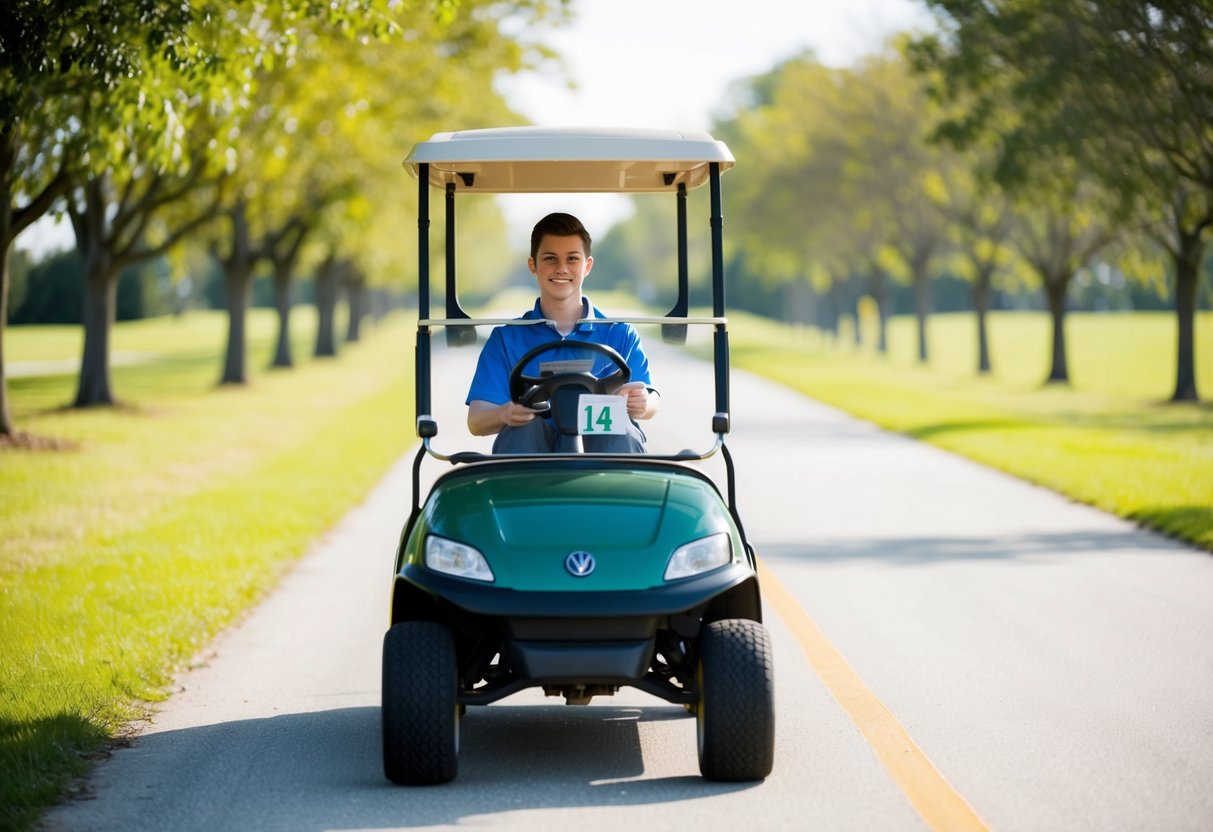Check out our golf rangefinders by Vovex to elevate your game!
Golf carts are a fun and convenient way to get around the course, but many wonder about the age requirements for driving them. In most U.S. states, you must be at least 14 years old to operate a golf cart on public roads. However, age restrictions can vary depending on location and specific regulations.
We often see younger golfers excited to take the wheel, but safety comes first. Private golf courses may have their own rules, sometimes allowing supervised children as young as 10 to drive carts on course paths. It's essential to check local laws and course policies before handing over the keys.
Driving a golf cart isn't just about age - it's about responsibility. Many clubs offer safety courses to ensure all drivers, regardless of age, understand how to operate carts safely. This knowledge helps create a more enjoyable experience for everyone on the green.
Key Takeaways
- Age requirements for driving golf carts vary by location and property type
- Safety training is crucial for all golf cart operators, regardless of age
- Local laws and course policies should always be consulted before driving a golf cart
Legal Driving Age for Golf Carts
Golf cart driving age requirements vary across different states and jurisdictions. Laws aim to balance safety concerns with practical use of these vehicles.
Varied State Regulations
We've found that golf cart driving regulations differ significantly from state to state. Some areas treat golf carts like regular vehicles, requiring a standard driver's license. Others have more relaxed rules, especially in golf communities or retirement villages.
In Florida, for example, drivers as young as 14 can operate golf carts on certain roads. Georgia allows 12-year-olds to drive golf carts in some areas. These lenient rules often apply to low-speed zones or designated golf cart paths.
Minimum Age Requirements
Most states set the minimum age for driving golf carts between 13 and 16 years old. This range reflects the lower risk associated with golf carts compared to regular cars.
Some key age restrictions we've noted:
- 13 years: Minimum age in South Carolina for daytime driving
- 14 years: Common minimum age in many states
- 16 years: Required in states treating golf carts like regular vehicles
It's crucial to check local laws before letting minors drive golf carts. Even within states, individual communities may have stricter rules. Some areas require adult supervision for younger drivers.
Driver's License and Permits
The rules for driving golf carts vary by location, with some areas requiring licenses or permits for younger drivers. Age restrictions and licensing requirements aim to promote safety on and off the course.
License Requirements
In many places, a standard driver's license is sufficient to operate a golf cart on public roads. The minimum age for this license is typically 16 or 17, depending on the state or country. Some areas have specific golf cart licenses, which may have lower age limits.
Golf courses often set their own rules. Many allow unlicensed drivers as young as 14 or 15 to operate carts on course property. It's crucial to check local regulations and course policies before letting young drivers behind the wheel.
Permit Possibilities for Young Drivers
Some regions offer special permits for younger golf cart drivers. These permits may be available to teens as young as 13 or 14. They often require:
- Passing a written test
- Completing a safety course
- Parental consent
- Restricted operating hours
These permits usually limit where and when young drivers can operate golf carts. For example, they might only be valid on private roads or within gated communities. We recommend checking with local authorities for specific permit options in your area.
Golf Cart Safety and Training
Golf cart safety and training are essential for responsible operation. Proper education helps prevent accidents and ensures everyone enjoys their time on the course.
Safety Courses
We recommend taking a golf cart safety course before operating one. These courses cover basic rules and best practices. Topics include speed limits, passenger limits, and proper turning techniques.
Many courses offer hands-on training with actual golf carts. This allows new drivers to practice in a controlled environment. Safety instructors provide personalized feedback to improve driving skills.
Some golf clubs require safety certification before allowing cart use. Check with your local course for specific requirements.
Training Programs
Golf cart training programs go beyond basic safety. They focus on advanced skills and course etiquette. Participants learn about cart maintenance and battery care.
Programs often include lessons on navigating different terrains. Hills, sand, and wet grass require special handling techniques. Drivers practice these skills under expert supervision.
Many training programs incorporate rules specific to individual courses. This ensures drivers are familiar with local policies and hazards. Some clubs offer free training sessions for new members.
We've found that regular refresher courses benefit even experienced drivers. They keep safety at the forefront and introduce updates to cart technology.
Golf Cart Usage Regulations
Golf cart regulations vary depending on whether you're on or off the course. Safety and etiquette are key considerations in both settings.
On-course Etiquette
We always follow the course's specific rules for cart usage. Many courses restrict carts to designated paths to protect the turf. We stay on cart paths near greens and tees.
Some courses use a 90-degree rule, where we drive on the path until reaching our ball, then turn at a right angle to approach it. We're mindful of wet areas and slopes to prevent damage or tipping.
It's courteous to park carts on the side of the green closest to the next tee. We keep noise to a minimum, especially when other players are preparing to hit.
Off-course Limitations
Golf cart use off the course is subject to local laws. In many areas, we can drive golf carts on roads with speed limits of 35 mph or less. Some communities allow golf carts in residential areas.
We must follow traffic laws and yield to pedestrians. Carts often require safety features like headlights, taillights, and turn signals for street use.
Many localities set age restrictions for driving golf carts off-course, typically 14-16 years old. We need a valid driver's license in some jurisdictions.
Insurance is often mandatory for off-course use. We check local regulations before taking a golf cart beyond the course.
Insurance Requirements
When it comes to golf cart insurance, requirements can vary depending on where you're driving. We've found that many golf courses include insurance coverage for carts used on their premises.
For personal golf carts used off-course, it's a different story. Most states require insurance if you're driving on public roads. Even if it's not mandatory, we strongly recommend getting coverage.
Typical golf cart insurance policies include:
- Liability coverage
- Collision coverage
- Comprehensive coverage
- Medical payments
The cost of insurance can range from $50 to $500 annually, depending on coverage levels and your location.
It's worth noting that homeowners insurance might provide limited coverage for golf carts. However, this usually only applies when the cart is used on your property.
We've seen some insurers offer discounts for safety features like seatbelts and headlights. It's always a good idea to shop around and compare quotes from different providers.
Remember, age restrictions for driving golf carts often align with insurance requirements. Younger drivers may face higher premiums or limited coverage options.
Parental Supervision and Consent
When it comes to young golfers driving carts, parental involvement is key. We've found that many golf courses require parental supervision for drivers under 16. This often means a parent or guardian must be present in the cart.
Some facilities ask parents to sign consent forms before letting minors operate golf carts. These forms typically outline safety rules and liability agreements. It's a good idea to check with your local course about their specific policies.
For younger kids, many parents choose to drive the cart themselves. This allows children to enjoy the game safely while learning proper cart etiquette. As kids grow older, they can gradually take on more responsibility under watchful eyes.
We recommend having frank discussions with children about cart safety. Establishing clear rules and expectations helps create a positive experience for everyone on the course. Remember, safety should always come first when introducing young golfers to cart driving.
Modifying Golf Carts and the Impact on Age Restrictions
Golf cart modifications can significantly affect age restrictions for drivers. We've seen many enthusiasts upgrade their carts with powerful motors and enhanced features.
These changes often blur the line between golf carts and more powerful vehicles. As a result, local laws may classify modified carts differently, impacting who can legally operate them.
Common modifications include:
- Increased top speed
- Larger wheels and tires
- Enhanced suspension
- Additional seating
- Street-legal lighting and signals
When we make these upgrades, it's crucial to check local regulations. Many areas require drivers to be 16 or older for modified carts, even if standard golf carts have lower age limits.
Some modifications may even reclassify a golf cart as a Low-Speed Vehicle (LSV). This change typically requires a valid driver's license to operate, regardless of age.
We always recommend consulting with local authorities before modifying a golf cart. It's the best way to ensure we're complying with age restrictions and other regulations.
Remember, safety should be our top priority. Even if modifications are legal, we need to consider whether younger drivers can safely handle the enhanced performance.
Community and Private Property Rules
We've found that age requirements for driving golf carts often vary based on community regulations and private property rules. Many residential communities with golf courses set their own policies.
Some neighborhoods allow teenagers as young as 14 to operate carts on community roads. Others restrict driving to those 16 and up with a valid driver's license.
Private golf clubs typically have more flexibility in setting age limits. We've seen courses that permit supervised children as young as 10 to drive carts with an adult.
Here are some common rules we've encountered:
- Minimum age of 14-16 years old
- Adult supervision required for drivers under 16
- Valid driver's license needed
- Signed liability waiver for underage drivers
- Speed limits of 10-15 mph on cart paths
It's crucial to check the specific regulations for your community or golf course. Rules can differ significantly between locations.
We recommend inquiring about age restrictions when booking tee times or joining a club.
Frequently Asked Questions
Golf cart driving age requirements vary by location. Let's explore some common questions about age restrictions for operating golf carts in different states and situations.
At what age can a minor legally operate a golf cart in Florida?
In Florida, the minimum age to drive a golf cart on public roads is 14 years old. However, on private property, there's no set minimum age. Parents or property owners can decide who they allow to operate golf carts on their land.
What are the age requirements to drive a golf cart in Texas?
Texas law doesn't specify a minimum age for driving golf carts. However, many local jurisdictions set their own rules. Some areas require drivers to be at least 16 and have a valid driver's license. It's best to check with local authorities for specific regulations.
Is there a minimum age for driving a golf cart in Ohio?
Ohio doesn't have a statewide minimum age for driving golf carts. Local municipalities can set their own rules. Many require golf cart operators to be at least 16 years old and possess a valid driver's license. Always check local ordinances before operating a golf cart.
Can children drive golf carts within their neighborhood, and if so, starting at what age?
This depends on local laws and neighborhood rules. Some communities allow children as young as 12 to drive golf carts on private roads. Others may require drivers to be 14 or 16. It's crucial to check with your homeowners' association or local government for specific guidelines.
Do you need a driver's license to operate a golf cart in Mississippi?
Mississippi state law doesn't require a driver's license for golf carts on private property. For public roads, operators typically need a valid driver's license. Local ordinances may have additional requirements, so it's wise to check with city or county officials.
What's the youngest age someone can be to drive a golf cart in Indiana?
Indiana doesn't have a specific state law regarding golf cart driving age. Local governments can set their own rules. Many cities require golf cart drivers to be at least 16 and have a valid driver's license. Some areas may allow younger drivers on private property.






